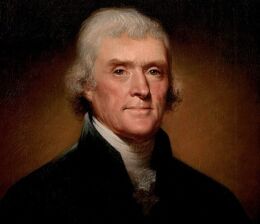White Nationalism Is Compatible with Classical Liberalism

Thomas Jefferson held White Nationalist views that are incompatible with those of today’s politicians.
1,505 words
There is nothing in the principles of free speech and individual liberty which bears responsibility for turning Western governments into the anti-white dystopias we live in today. It was rather the toxic pill that was hostile foreign aliens that poisoned the great Enlightenment project from the start. When White Nationalists criticize classical liberals for proposing inadequate solutions to modern problems, they are specifically criticizing individuals who are not White Nationalists or even white advocates. All of their criticisms are properly directed at these individuals’ lack of white solidarity rather than classical liberalism itself.
Is it possible to be both a classical liberal and a White Nationalist? Yes, of course. In fact, it has already been demonstrated that America’s Founding Fathers were White Nationalists of a sort, even if they were not the kind we have today. A sharper focus on racial questions is required in today’s climate. But in fairness, the European men of George Washington’s time had not had the miserable and toxic experience of those generations who were living in forced proximity with alien races and cultures. They could not possibly have realized the threat of bringing the African slaves into the American Eden. They were also quite naïve about the subversive, Machiavellian gamesmanship of the Jews.
For more on the topic of the Founding Fathers’ White Nationalism, read Jared Taylor’s essay on the topic at American Renaissance. No less than Benjamin Franklin, James Madison, Thomas Jefferson, John Jay, John Quincy Adams, and Alexander Hamilton articulated their view that the United States was exclusively a country for a white citizenry. Clearly, the Founders had a different conception of the United States than America’s twenty-first century politicians. They had specifically reserved citizenship for “free white men” of “good character” in documents such as the Naturalization Act of 1790.
Critics of the Enlightenment have argued that classical liberalism supposedly necessitated the tyrannical, state-enforced “equality” and integration of the races that we have today. Tell that to Thomas Jefferson. In his autobiography, written in 1821, Jefferson wrote:
Nothing is more certainly written in the book of fate than that these people are to be free. Nor is it less certain that the two races, equally free, cannot live in the same government. Nature, habit, opinion has drawn indelible lines of distinction between them.
This quote is inscribed on the Jefferson Memorial in Washington, DC, but has been shortened to omit the part about separation of the races. Jefferson was much closer to Jared Taylor than modern Americans realize.
A further demonstration of Jefferson’s understanding that classical liberalism did not necessitate “equality” between races within the same nation is inferred from his disparate reactions to the other Enlightenment revolutions of his age in France and Haiti. While Jefferson supported the French Revolution, he vehemently opposed that in Haiti.[1] In Haiti the revolution was a racial one, with black slaves rising up to kill the white French colonists. Jefferson opposed this on racial grounds because he was a race realist with loyalty to his own kind. The Haitian Revolution, with its apocalyptic hues of modern race war, shares much more in common with twenty-first century woke revolutionaries than with the American Revolution. There should be no serious doubt that if Jefferson were alive today, his politics would align more with the dissident Right than with any mainstream politician of today.

You can buy Greg Johnson’s The White Nationalist Manifesto here
There should also be no serious doubt that the United States was intended to be a white nation, given the explicit references to white identity in its founding documents. Would a classical liberal white nation founded in the twenty-first century necessarily end up in the same way as the US? Most on the dissident Right seem to presume that to be the case, although this view is completely unfounded. Hindsight is 20/20, and we have a field of vision and generations of painful experience that our forefathers did not. If a white nation were to be founded according to the principles outlined in Greg Johnson’s White Nationalist Manifesto, for example, the conditions of that nation’s founding would be quite different from those of eighteenth-century America.
I would argue that these differences would be decisive. First, we would have no black slaves within our borders, nor slaves of any kind. Not only that, but we would have a de facto homogeneous white nation, so there would be no aliens to subvert white interests in the first place. Second, political philosophy is not a religion, or at least it shouldn’t be treated that way. Anything that the founders of such a state would agree by consensus that the Enlightenment thinkers, including the Founding Fathers, got wrong we could discard and replace with new ideas. The most prominent example of this are ideas about equality and statements such as “all men are created equal,” which was coined by Jefferson in the Declaration of Independence. Such things have been wildly misinterpreted and used to subvert the core idea of the nation, putting the most heinous minority groups, such as men who cut off their penises and then pretend to be women, in a dominant position over the majority.
Doing away with these ideas does not run counter to the Enlightenment’s core principles; rather, it is fundamental to its nature. You cannot have a true democracy if the majority is not able to dictate the society’s overriding objectives and values. “All men are created equal” is anti-democratic and leads to a tyranny of the minority. But just because some of these ideas were naïve or improperly articulated does not mean that we should discard them altogether. Nothing has transpired in the American experiment which argues against the bedrock values of free speech, freedom of religion, or democracy.
Defending democracy is where the most controversy will occur within the dissident Right. It is true that democracy has been an unsatisfactory disaster within the living memory of anyone alive today. But this does not necessarily have to be the case, nor is there a better system available.
What American “democracy” has become is an affront to its intended purpose. Democracy does not work in a polarized multicultural, multiracial society. Democracy properly functions in a homogeneous society where the people share a similar bloodline, traditions, and general objectives for their people. Where good-faith disagreements arise, they can be peacefully resolved through elections. What democracy is not intended to do is to settle the balance of power between warring tribes who should not be sharing the same government in the first place, and who do not have good-faith disagreements. The population of the US is becoming increasingly dissatisfied with the electoral process because they cannot live with the results of losing. Whoever wins in the clash of civilizations that American elections have become will use the government’s awesome power to oppress their political rivals. This process teeters back and forth to some extent, but is unsustainable. Everyone can see that the US is teetering on the edge of an abyss.
This dissatisfaction with democracy and our broken electoral system has been incorrectly laid at the feet of classical liberalism itself, and not at multiculturalism’s where it belongs. Because democracy is the only system most of us have experienced, it receives most of the blame for our present state of affairs. Some would like us to return to a more authoritarian style of government such as fascism or monarchy. The problems with these systems have never been resolved, however, and they only seem better due to our lack of experience with them. The ideal of the philosopher-king or the great leader is very rarely actualized in reality, if it has ever been achieved at all. Keep in mind that authoritarian leaders are often masters of propaganda and effectively silence any criticism of their regime; thus, we often cannot trust the historical accounts we have of them. What is clear is that these forms of government lead to disastrous succession problems. Even if you have a good king or leader at one point, his death is usually followed by centuries of decline and tyranny while his unworthy heirs clash over a polity that only a rare Great Man could have held together.
Classical liberalism is still the best system for ensuring succession without violence, upholding the will of the majority, and maintaining tolerable standards of living for dissidents — provided that we have effective racial homogeneity.
Note
[1] Stated in Jefferson’s letter to James Monroe of July 14, 1793: “The situation of the St. Domingo fugitives (aristocrats as they are) calls aloud for pity and charity. Never was so deep a tragedy presented to the feelings of man. . . . I become daily more and more convinced that all the West India islands will remain in the hands of the people of colour, and a total expulsion of the whites sooner or later take place. It is high time we should foresee the bloody scenes which our children certainly, and possibly ourselves (South of Patowmac) have to wade through, and try to avert them.”


